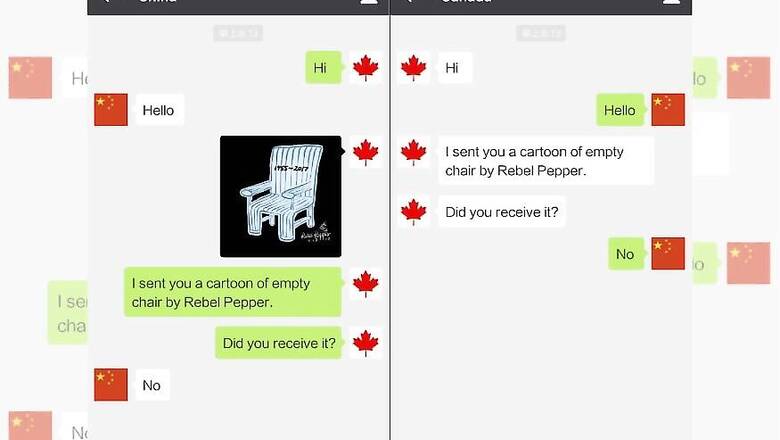
views
Chinese instant messaging app, WeChat, is using its international users to train their algorithms and implement even more robust censorship in China. WeChat is owned by Chinese tech company Tencent. This shocking revelation comes as part of the research by the University of Toronto’s Citizen Lab. The instant messaging app that has more than 1.15 billion users around the world.
The Citizen Lab researchers found that messages sent and received by foreign accounts are analyzed by WeChat’s algorithms to see whether they may be politically sensitive. However, these messages are not censored. However, if one such message is sent by or to a Chinese account holder, WeChat will censor that message. This includes images and documents.
The way this works is that any account registered for WeChat with a Chinese phone number, has to adhere to WeChat’s terms of service—and they have to follow the national regulations in terms of what can be shared on web platforms, and what cannot be. That is true, say the researchers, even if an account originally registered with a Chinese phone number, switches to an international number.
Have you also read?
Noodles & Pandas: Chinese Social Media Users Are Talking About Coronavirus in Secret Lingo
“Our results show that on each day of testing, if a sensitive document is first sent from a non-China-registered account to non-China-registered accounts, before sending it to a China-registered account, they are censored in real time when sent to a China-registered account. This finding shows that documents sent even entirely among non-China-registered accounts undergo content surveillance and that these documents are used to build-up the censorship system to which China-registered accounts are subjected,” say the researchers.
China’s cyber laws are rather broadly defined. In the new set of guidelines that went live in March, in the midst of the measures to contain the Coronavirus, or COVID-19 outbreak. Among the long list of do’s and don’ts released by the Cyberspace Administration of China in the Regulations on the Ecological Governance of Network Information Content, one guideline that truly stands out is the one that reads “spreading rumors and disturbing the economic and social order” under Article 6 which headlines Producers of online information content may not produce, copy or publish illegal information containing the following contents”.
In China, WeChat is considered a super-app, and offers multiple layers of functionality including instant messaging, social network on the lines of Facebook, mobile payments, news and access to other apps and platforms. In a way, it really cannot be ignored by Chinese citizens.
The researchers do say that any surveillance on non-China accounts on WhatsApp is undetectable to users. At no point is any message censored or altered, except that Tencent is potentially using the messages, images and documents shared by these users to understand what can be censored and training the algorithms that are then applied for users in China or registered with a Chinese phone number.
Incidentally, Tencent’s privacy policy documents for China and the rest of the world, does not indicate that non-China accounts will be under surveillance. “Overall, we found, first, that neither the China nor international public policy documents made clear to users that non-China accounts could have their content surveilled and the resulting hashes used to censor content for China-registered accounts. Second, we found it was plausible that the international policy documents could permit content surveillance of international users’ communications, but the company did not respond to these questions. Third, we found that it was unclear on what basis the hashes of international users’ communications could be shared with WeChat China, and the company did not respond to these questions,” says the research.
Citizen Lab’s results come after a series of tests done between November 2019 to January 2020, to understand how WeChat may be censoring content.
Have you also read?
WeChat is Censoring Coronavirus Keywords, Because China Doesn’t Like Bad Press?
In March, Citizen Lab had also revealed that WeChat was actively blocking any messages which had specific keywords or a combination of keywords around the Coronavirus, or COVID. These included “discussions of central leaders’ responses to the outbreak, critical and neutral references to government policies on handling the epidemic, responses to the outbreak in Hong Kong, Taiwan, and Macau, speculative and factual information on the disease, references to Dr. Li Wenliang, and collective action.” They also discovered that references to President Xi Jinping as well as other central government and Party leaders including Premier Li Keqiang, Vice Premier Sun Chunlan, and the Politburo Standing Committee of the Communist Party of China as a collective agency are high on censorship priority.




















Comments
0 comment